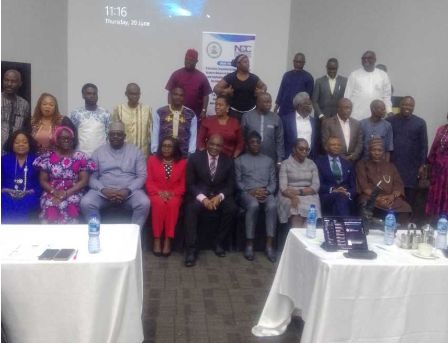The Nigerian Communications Commission management executives, among them economic and top media executives have listed the efforts of the Commission in achieving the telecom service dream for the country.
Besides bids in driving telecom services to the unserved and underserved areas through its various programmes, the commission said it is moving from the era of not only optimising the quality of services to achieving quality subscriber experience.
Quality of experience (QoE or QoX) is a measure of the overall level of a customer’s satisfaction and experience with a product or service and the vendor that’s providing that product or service.
The NCC chiefs and the economic and media experts spoke at a recently organised two-day training session for media executives in Lagos, titled “Upskilling on Trends in the Telecom Sector for Media Executives.” This event aimed to update media stakeholders on the latest developments, regulatory strides, challenges, and prospects in the telecom industry.
The event which was held at the Providence Hotel in Ikeja, Lagos State, featured several sessions on the telecom industry. Topics covered included an overview of trends in the local and international telecom ecosystem, the role of compliance and consumer protection, enhancing a healthy competition regime, cybersecurity issues, and the impact on the digital economy.
Reuben Mouka, Director of Public Affairs, said the training session was a promise kept by Dr Aminu Maida, underscoring the NCC’s commitment to ensuring media stakeholders fully understand the intricacies of information technology. He highlighted the participation of resource professionals from within and outside the NCC.
In his opening remarks, Dr Aminu Maida, Executive Vice Chairman/CEO of NCC, who was represented by Engr. Abraham Oshadami, Executive Commissioner, of Technical Services at NCC, noted the significant changes in the Nigerian telecom industry while stressing the importance of stakeholders understanding how technology drives the world, aiming for a more enlightened media community post-training.
Dr Maina emphasised the importance of understanding technological advancements and the need for media stakeholders to stay informed. He stated that the training would promote specialisation in the digital age and provide media stakeholders with a deeper understanding of the evolution of the Nigerian telecom sector.
The EVC said “It will be easy for you to report and make it practical to those who will read to be able to understand better how the industry works. This also requires that your knowledge of laws, policies, regulations, guidelines and all that, need to be updated so that you don’t miss the current reality of our time.
“You are important stakeholders because you occupy that position of helping people to understand so you need to understand how it works before you can use it effectively. The importance of this gathering can never be over-emphasized because the success of our industry depends largely on you, the media stakeholders.
“The way you write your report will determine how people understand it. It is your understanding of how it works that will also help you to understand what are the challenges and it is easier for you to help people to also understand. So you need to have knowledge of the activities of the regulators and also catch up with emerging technologies”.
Engr. Oshadami, speaking on “An Overview of Trends in the Local/International Telecom Ecosystem,” traced the growth of telecom from analogue to digital, highlighting the increase from a few thousand connected lines in 2001 to over 200 million active lines in 2024. He attributed this growth to the liberalisation brought by the establishment of the NCC in 1992.
Efosa Idehen, Director of compliance Monitoring and Enforcement at NCC, discussed “The Role of Compliance and Consumer Protection in Nigeria’s Telecom Industry.” He emphasised the need for a fair and regulated environment to address challenges such as poor service quality, inadequate infrastructure, and cybercrime. Idehen highlighted the NCC’s role in ensuring consumer satisfaction and protection through effective complaints resolution mechanisms and regular monitoring.
Ayuba Shuaibu, Director of Policy, Competition and Economic Analysis at NCC, spoke on “Enhancing a Healthy Competition Regime in Telecom,” outlining the importance of preventing anti-competitive practices and promoting consumer choice. He called on media stakeholders to raise awareness and shape public opinion.
Engr. Babagana Digima, Head of New Media and Information Security, addressed “Cybersecurity Issues and Impact on Digital Economy,” emphasising the critical role of cybersecurity in protecting information and systems. He highlighted various cyber threats and the NCC’s efforts in establishing a Computer Security Incident Response Team (CSIRT).
Dr Adedoyin Salami, a noted economist, spoke on “Technology: Significance on Micro and Macro Economic Systems,” detailing the telecom sector’s growth and its impact on Nigeria’s economy. He noted the sector’s significant contribution to economic output and employment.
Usman Mamman, Director of Licensing and Authorisation, discussed “New Trends in Licensing and Authorisation,” highlighting the benefits of liberalisation and competitive markets in improving service quality and access.
Edoyemi Ogoh, Director of Technical Standards and Network Integrity, covered the transition from Quality of Service (QoS) to Quality of Experience (QoE), stressing the importance of user satisfaction in the digital age.
Co-host Frank Aigbogun led a session on “Navigating Specialised Reporting: Exploring the Communications & Digital Economy Sector,” emphasising journalism’s role in fostering a prosperous economy and healthy competition.
Engr. Oshadami also presented “Optimising Spectrum Administration in Telecommunications,” explaining the importance of efficient spectrum management in stimulating economic growth.
Mrs Chizua Whyte, Acting Head of Legal & Regulatory Services, concluded with a discussion on the “Dynamics of the Legal and Regulatory Ecosystem in Nigeria’s Telecom Industry,” emphasising the need for stakeholders to stay informed and engaged.
Overall, the NCC’s training session was a significant step towards promoting a better understanding of the telecom industry among media stakeholders, with expectations of a positive impact on the sector as a whole.











